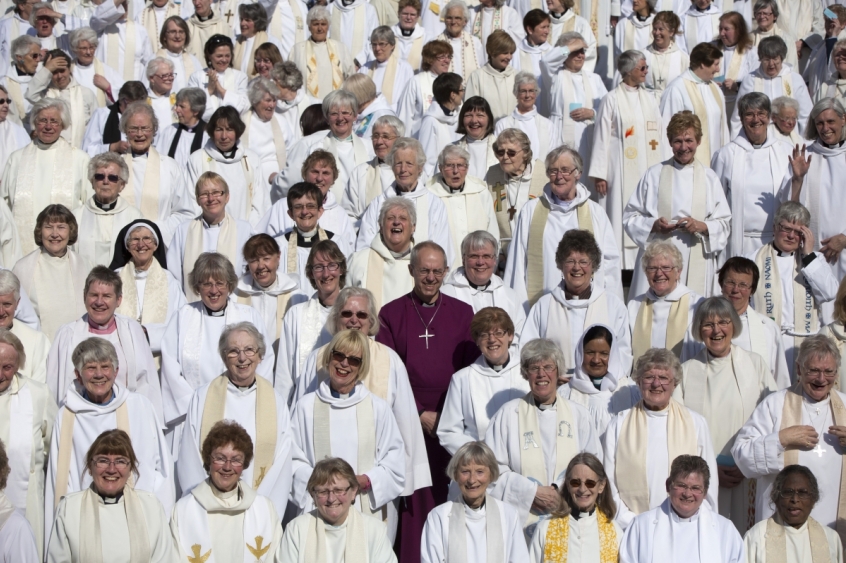
The Church is getting really good at investing in female leaders. There have never been so many initiatives and programmes designed to encourage and train women in leadership; never before so many networks or statements of support from the stage. You can't put on a conference these days without at least some semblance of platform gender balance, lest you'll be melted by a death-ray of Twitter rage. Gender equality is all the rage these days, and finally it looks like the Church has caught up.
Or at least, the Church is making a really good show of catching up. Recently though, I've come to wonder if the desire to see men and women leading equally in the Church has penetrated beyond the kind of 'plastic egalitarianism' that has the appearance of equality, but the substance of tokenism.
I recently attended a gathering where most of the largest churches in the UK were represented. It was a room filled with the leading lights of British church leadership; senior pastors and their very key staff. These were the people in the most important and influential positions in the Church in this country. And let's just say that the queue for the ladies' toilets was never a problem.
In fact, that probably treats the issue too gently. Ninety per cent of the people in the room were male; if you were to take pastors' wives out of the equation, that number would look even worse. So in an age where we're talking about and investing in women's leadership more than ever before, this is the reality: the big churches are almost exclusively led by men; not just in terms of the top jobs, but the senior leadership teams below them.
Which begs the question: what exactly are we training all these women for? Delegates at Holy Trinty Brompton's London Leadership Conference are split fairly evenly by gender, and I'm sure the same is true for similar events run by the Willow Creek Association and others. There's no doubt that women are being invested in, but it seems to me that many of them are heading towards a huge bottleneck, if indeed they haven't already found themselves caught by it.
Perhaps that's why so many women are thriving in leadership positions within para-church organisations. I'm proud to work for a youth ministry organisation which is led by a gender-balanced team of four, and coming up through the organisation I'm excited to see a whole wave of gifted women leading projects, and honing their skills for even bigger jobs in the future. But will those roles only ever exist for them within the para-church? Have Christian organisations become a convenient 'out' for secretly-complementarian leadership development theology?
What makes this more challenging is the prevailing narrative within the Church at the moment that 'the local church is the answer'. That after a few decades in which Christian organisations have taken the lead in challenging and sometimes hauling the Church forward on issues like justice and mission, the Spirit of God now seems to be moving in incredible ways through churches on the ground; small(ish) groups of people getting heavily involved in their communities, and making real change there. Actually, many of us within the para-church subscribe to that narrative too; we see ourselves merely as fertiliser for the soil where so much great growth is happening.
If that's the case though, then we really have a problem. Because, to caricature slightly, it would seem that while we're developing great female leaders, they're not being trusted with the really big jobs; the jobs which are located 'where the action is.' That's not to say that there aren't women leading churches; the Church of England alone now has a raft of gifted females either already in leadership positions, or going through the process of ordination, and it's also taken a prophetic lead with the appointment of women bishops. But if our biggest churches still reserve all the leadership roles for men, what's really going on everywhere else?
Of course, for some churches this is an issue of theology, not equality or justice; a difference of opinion and biblical interpretation which I respect. For many others though, there are more dangerous and dysfunctional reasons; deep-down beliefs that men lead better; nepotistic recruitment styles, and a vicious-circle leader development policy which means men can only mentor men. And those churches can, and must do better than that.
Unless your theology is ultra-conservative, there should be room within your leadership team for women, even if it's not in the top job. And I'm not sure promoting your wife into such a role should count as fulfilling some sort of unspoken quota; for a start what does that communicate to all the brilliant unmarried women leaders out there? To have our thriving churches so overwhelmingly led by men simply reinforces the idea that we still have one foot stuck in the dark ages; and more importantly, it's just not right. Actually, it's worse than that: it's offensive.
We have to move on this. Churches have to recognise their gifted women and trust them with the responsibilities of leadership. The great news is that we've got a whole generation of ready-made female leaders just waiting for the opportunity. Instead of leaving them to get frustrated, let's find roles of real influence where they can serve God and our congregations – even and especially in the biggest churches. It's what we've been training them for, after all.
Martin Saunders is a Contributing Editor for Christian Today and the Deputy CEO of Youthscape. Follow him on Twitter @martinsaunders.













